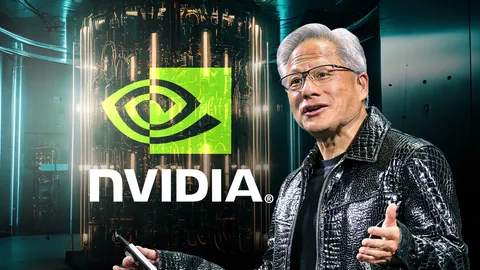Nvidia is making a significant push into the world of quantum computing by establishing a dedicated research center in Boston. This new facility, dubbed the Nvidia Accelerated Quantum Research Center (NVAQC), will serve as a hub for collaboration between Nvidia and leading researchers from Harvard University and the Massachusetts Institute of Technology (MIT), along with other technology firms and quantum computing innovators. The goal is to accelerate the development of quantum computing and integrate it with classical AI supercomputing to unlock new possibilities in various fields.
The NVAQC represents a major investment by Nvidia in the burgeoning quantum computing landscape. The center will focus on tackling some of the most pressing challenges in the field, such as reducing qubit noise and transforming experimental quantum processors into practical and reliable devices. By combining its expertise in AI and accelerated computing with the cutting-edge research being conducted at Harvard and MIT, Nvidia aims to drive breakthroughs that will bring useful quantum computers closer to reality.
Nvidia's CEO, Jensen Huang, has acknowledged the rapid progress being made in quantum computing, revising his earlier estimates of when the technology would become practical. He emphasized the importance of collaboration within the quantum research community to advance hybrid computing approaches.
The collaboration with Harvard and MIT is a key component of Nvidia's strategy. The NVAQC will work closely with the Harvard Quantum Initiative in Science and Engineering (HQI) and the Engineering Quantum Systems (EQuS) group at MIT. These partnerships will allow Nvidia to leverage the expertise of leading quantum scientists and engineers, fostering innovation and accelerating the development of practical quantum applications.
Researchers at MIT's EQuS group will use the NVAQC to develop techniques like quantum error correction. Harvard's HQI sees the NVAQC as a valuable addition to the Boston area's quantum ecosystem, with the potential to advance research in areas ranging from quantum error correction to applications of quantum computing systems.
The NVAQC will be equipped with state-of-the-art Nvidia technology, including GB200 NVL72 rack-scale systems, the most powerful hardware ever deployed for quantum computing applications. These systems will enable complex simulations of quantum systems and facilitate the development of low-latency quantum hardware control algorithms essential for quantum error correction. The center will also utilize the Nvidia CUDA-Q quantum development platform, empowering researchers to create new hybrid quantum algorithms and applications. The NVAQC is set to begin operations later in 2025.
While Nvidia isn't planning to build physical quantum computers themselves, the company is focusing on developing the algorithms and software tools necessary to harness the power of quantum systems. Nvidia sees its role as an enabler, providing the infrastructure and expertise needed to accelerate progress in the field. This includes building scalable quantum hardware, optimizing software tools, and developing algorithms capable of harnessing quantum systems for real-world applications.
The establishment of the NVAQC further solidifies Boston's position as a hub for technological innovation, particularly in the field of quantum computing. The center will contribute to the region's vibrant ecosystem of quantum startups, research institutions, and technology companies, driving further advancements and attracting talent to the area.

















